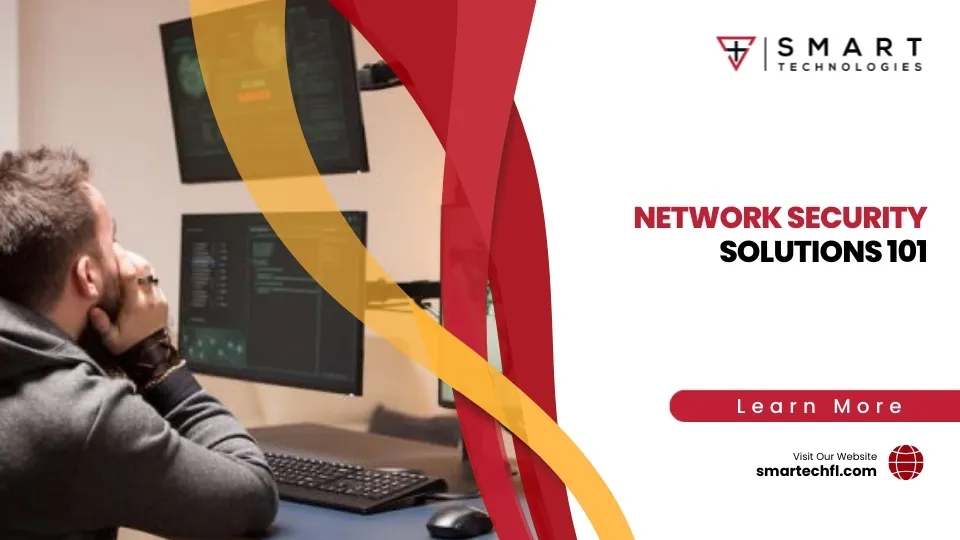Essential Cybersecurity Services for Dayton Beach Businesses
Cybersecurity Services for Dayton Beach
Cybersecurity has become a cornerstone of business operations, ensuring that sensitive data, customer information, and company assets are protected from the ever-growing threat of cyber attacks. For businesses in Daytona Beach, having robust cybersecurity services is not just a necessity but a crucial element for sustainable growth and trust.
This article delves into the essential cybersecurity services every business should consider, focusing on the importance of partnering with reliable providers to enhance security and resilience.

What Are Cybersecurity Services?
Cybersecurity services encompass a range of solutions designed to protect computer systems, networks, and data from unauthorized access, theft, and damage. These services aim to prevent cyber threats such as hacking, phishing, ransomware, and other malicious activities. By implementing comprehensive cybersecurity measures, businesses can safeguard their digital assets, maintain customer trust, and comply with regulatory requirements.
Cybersecurity services are crucial in today’s interconnected world, where cyber threats are increasingly sophisticated and frequent. They provide a layered defense strategy that includes preventive, detective, and responsive measures to ensure a business’s overall security posture.
Types of Cybersecurity Services
Managed Security Services
Managed security services involve outsourcing the management of a company’s security infrastructure to a third-party provider. These services include continuous monitoring, threat detection, incident response, and regular security assessments. By leveraging managed security services, businesses can benefit from expert knowledge and advanced security technologies without the need for significant in-house resources.
- Explanation and Benefits:
- Continuous monitoring and real-time threat detection.
- Rapid incident response and mitigation.
- Access to the latest security technologies and expertise.
- Cost-effective solution compared to maintaining an in-house security team.
Vulnerability Management
Vulnerability management is the process of identifying, evaluating, and addressing security vulnerabilities in a company’s IT environment. This proactive approach helps to prevent cyber attacks by ensuring that security weaknesses are promptly identified and remediated.
- Importance of Identifying and Addressing Vulnerabilities:
- Regular vulnerability scans and assessments to detect security flaws.
- Prioritization of vulnerabilities based on risk and potential impact.
- Implementation of patches and security updates to mitigate risks.
- Continuous improvement of the organization’s security posture.
Endpoint Detection and Response (EDR)
Endpoint Detection and Response (EDR) solutions focus on monitoring and protecting endpoints such as computers, mobile devices, and servers. EDR tools detect suspicious activities, analyze threats, and provide automated responses to mitigate potential breaches.
- Protecting Endpoints from Cyber Threats:
- Real-time monitoring of endpoint activities.
- Detection of malware, ransomware, and other malicious software.
- Automated response and remediation to contain threats.
- Comprehensive visibility into endpoint security incidents.
Incident Response
Incident response involves a structured approach to handling security incidents, including preparation, detection, containment, eradication, and recovery. An effective incident response plan helps businesses minimize the impact of cyber attacks and quickly restore normal operations.
- Handling and Mitigating Cyber Incidents:
- Development of an incident response plan tailored to the organization’s needs.
- Rapid identification and containment of security breaches.
- Thorough investigation and analysis of incidents.
- Effective communication and coordination during incident response efforts.
Penetration Testing
Penetration testing, or ethical hacking, involves simulating cyber attacks on a company’s systems to identify and exploit vulnerabilities. This testing helps businesses understand their security weaknesses and improve their defenses.
- Simulating Cyber Attacks to Test Defenses:
- Conducting controlled attacks to assess security measures.
- Identifying potential entry points and vulnerabilities.
- Providing actionable recommendations to enhance security.
- Strengthening the organization’s overall cybersecurity posture.
Cybersecurity Solutions for Businesses
Cybersecurity solutions are tailored to meet the specific needs of businesses, providing a comprehensive approach to security. These solutions include a combination of technologies, processes, and practices designed to protect information and IT infrastructure from cyber threats.
- Customizable Cybersecurity Solutions:
- Integration of various security tools and technologies.
- Development of policies and procedures to ensure consistent security practices.
- Continuous evaluation and improvement of security measures.
- Collaboration with security experts to address unique business challenges.
Key Components of a Strong Cybersecurity Solutions

Risk Assessment and Management
Conducting regular cybersecurity risk assessments is vital for identifying potential threats and vulnerabilities. This process involves evaluating the likelihood and impact of various cyber risks and implementing appropriate controls to mitigate them.
- Conducting Thorough Cybersecurity Risk Assessments:
- Identifying critical assets and data.
- Analyzing potential threats and vulnerabilities.
- Assessing the effectiveness of existing security controls.
- Developing and implementing risk mitigation strategies.
Security Monitoring and Operations
Continuous monitoring and management of security operations are essential for detecting and responding to cyber threats in real time. Security Operations Centers (SOCs) play a crucial role in maintaining an organization’s security posture.
- Continuous Monitoring and Management of Security Operations:
- Real-time monitoring of network traffic and system activities.
- Detection of anomalies and potential security incidents.
- Coordination of incident response efforts.
- Regular reporting and analysis of security events.
Advisory Services
Advisory services provide businesses with expert guidance on enhancing their cybersecurity measures. These services include security assessments, strategic planning, and ongoing support to help organizations stay ahead of evolving threats.
- Expert Guidance to Improve Security Measures:
- Comprehensive security assessments and gap analysis.
- Development of strategic security plans.
- Implementation support and best practices.
- Ongoing advisory and consultancy services.
Implementing Cyber Services
How to Choose a Cybersecurity Service Provider
Selecting the right cybersecurity service provider is a critical step in ensuring your business’s security. With many providers offering various services, it’s essential to evaluate them based on specific criteria to find the best fit for your needs.
- Factors to Consider When Selecting a Provider:
- Reputation and Experience: Look for providers with a proven track record in the industry. Check customer reviews, case studies, and ask for references.
- Range of Services: Ensure the provider offers a comprehensive suite of services that cover all your cybersecurity needs, from risk assessments to incident response.
- Technology and Tools: Evaluate the technologies and tools used by the provider. They should be up-to-date with the latest cybersecurity advancements.
- Expertise and Certifications: Verify the expertise of the provider’s team. Certifications like CISSP, CISM, and CEH indicate a high level of professional competency.
- Cost and Value: Compare the cost of services with the value provided. Look for transparent pricing models and consider the long-term benefits of the investment.
- Customer Support: Ensure the provider offers robust customer support with 24/7 availability, especially for critical incidents.
The Role of Managed Security Services Providers (MSSPs)
Managed Security Services Providers (MSSPs) play a vital role in enhancing your business’s cybersecurity posture by offering continuous monitoring and management of your security infrastructure. They act as an extension of your IT team, providing expertise and resources that may be lacking in-house.
- Benefits of Partnering with MSSPs:
- Continuous Monitoring: MSSPs provide around-the-clock monitoring of your networks and systems, ensuring threats are detected and addressed promptly.
- Expert Knowledge: MSSPs have access to a team of cybersecurity experts who stay updated with the latest threats and security practices.
- Cost-Effective Solutions: Outsourcing to MSSPs can be more cost-effective than building and maintaining an in-house security team.
- Proactive Threat Management: MSSPs use advanced tools and techniques to identify and mitigate threats before they can cause significant harm.
Developing a Comprehensive Cybersecurity Program
A robust cybersecurity program is essential for protecting your business from cyber threats. This program should be comprehensive, covering all aspects of your IT environment and tailored to your specific needs.
- Steps to Build an Effective Cybersecurity Program:
- Assessment and Planning: Start with a thorough risk assessment to identify vulnerabilities and threats. Develop a strategic plan that addresses these risks.
- Policy Development: Create and enforce security policies and procedures. Ensure all employees understand and follow these guidelines.
- Implementation of Security Controls: Deploy security technologies such as firewalls, intrusion detection systems, and antivirus software.
- Employee Training and Awareness: Regularly train employees on cybersecurity best practices and emerging threats.
- Incident Response Planning: Develop and test an incident response plan to ensure quick and effective handling of security incidents.
Enhancing Security Posture with Advanced Techniques
To stay ahead of cyber threats, businesses must continuously enhance their security posture using advanced techniques and technologies. This involves adopting the latest cybersecurity innovations and practices.
- Utilizing the Latest Cybersecurity Technologies and Practices:
- Artificial Intelligence and Machine Learning: Leverage AI and ML to detect and respond to threats more effectively.
- Behavioral Analytics: Use behavioral analytics to identify anomalies in user behavior that may indicate a security breach.
- Zero Trust Architecture: Implement a Zero Trust model to ensure that no user or device is trusted by default, regardless of their location or credentials.
- Advanced Threat Intelligence: Utilize threat intelligence platforms to stay informed about the latest cyber threats and vulnerabilities.
The Importance of Security Monitoring and Incident Response
Continuous security monitoring and a robust incident response plan are critical components of a strong cybersecurity posture. These practices ensure that threats are detected early and managed efficiently to minimize damage.
- Proactive Monitoring and Quick Incident Response:
- 24/7 Security Monitoring: Implement around-the-clock monitoring to detect and respond to threats in real time.
- Automated Threat Detection: Use automated tools to identify and mitigate threats swiftly.
- Incident Response Team: Establish a dedicated incident response team trained to handle various types of security incidents.
- Post-Incident Analysis: Conduct thorough post-incident reviews to identify weaknesses and improve future responses.
Specialized Cybersecurity Services for Daytona Beach Businesses
Cybersecurity needs can vary greatly depending on the industry and specific business requirements. Specialized services tailored to these needs can provide more effective protection.
- Tailored Services to Address Local Business Needs:
- Regulatory Compliance: Ensure your business complies with local and industry-specific regulations.
- Industry-Specific Solutions: Implement cybersecurity measures tailored to your industry, whether it’s healthcare, finance, retail, or another sector.
- Local Threat Landscape: Understand and address the specific cyber threats prevalent in the Daytona Beach area.
Addressing Specific Cyber Threats

Businesses must be prepared to address a range of specific cyber threats that can cause significant harm. This includes phishing attacks, malware, ransomware, and distributed denial of service (DDoS) attacks.
- Strategies to Combat Phishing Attacks, Malware, Ransomware, and DDoS Attacks:
- Phishing Attacks: Implement email filtering, employee training, and multi-factor authentication to reduce the risk of phishing attacks.
- Malware and Ransomware: Use antivirus software, regular backups, and endpoint security solutions to protect against malware and ransomware.
- DDoS Attacks: Deploy DDoS protection services to ensure your website and online services remain accessible during an attack.
- Regular Updates and Patching: Keep all systems and software up-to-date to close vulnerabilities that could be exploited by cybercriminals.
What People May Also Ask
What are the most common cybersecurity services offered by providers?
Providers typically offer managed security services, vulnerability management, endpoint detection and response, incident response, and penetration testing. These services help businesses identify and mitigate cyber threats, protect their IT infrastructure, and respond quickly to security incidents.
How do cybersecurity services help protect my business?
Cybersecurity services provide a comprehensive approach to protecting your business by identifying vulnerabilities, implementing security measures, monitoring for threats, and responding to incidents. They help safeguard your data, maintain customer trust, and ensure compliance with regulatory requirements.
Why is endpoint security important for my organization?
Endpoints, such as computers and mobile devices, are often the entry points for cyber attacks. Endpoint security solutions monitor and protect these devices, preventing malware, ransomware, and other threats from compromising your network.
What should I look for in a cybersecurity service provider?
Look for a provider with a strong reputation, a comprehensive range of services, advanced technologies, certified expertise, transparent pricing, and excellent customer support. Ensure they understand your specific business needs and can offer tailored solutions.
How often should I conduct a cybersecurity risk assessment?
It’s recommended to conduct a cybersecurity risk assessment at least annually or whenever there are significant changes to your IT environment. Regular assessments help identify new vulnerabilities and ensure your security measures remain effective.
Conclusion of Cybersecurity Services in Daytona BeachConclusion
Investing in comprehensive cybersecurity services is essential for businesses in Daytona Beach to protect their digital assets and maintain operational resilience. By partnering with a trusted cybersecurity provider, businesses can enhance their security posture, stay ahead of evolving threats, and ensure long-term success. Don’t wait for a cyber attack to happen—take proactive steps today to safeguard your business.
You can contact us by phone, email, or by visiting our offices:
- Phone: (386) 261-8323
- Email: contact@smarttechfl.com
- Address: 771 Fentress Blvd. #10, Daytona Beach, FL 32114












